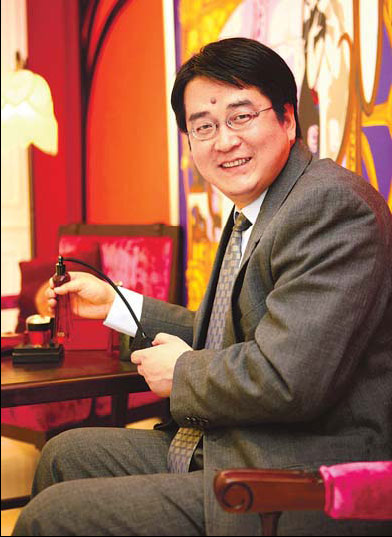Companies
VIVE range aspires to the sweet smell of success
By Bao Chang (China Daily)
Updated: 2010-05-24 13:18
 |
Large Medium Small |
|
 |
|
Wang Zhuo, vice-president of Shanghai Jahwa, said his company would try to win consumers' trust with high class quality and service. [Provided to China Daily] |
SHANGHAI - Shanghai's Bund in the 1930s was a place where jazz mixed with gun shots, high society mixed with triads, celebrities mixed with spies and extravaganza mixed with adventure.
It has left a memory that few other cities on earth could aspire to. At least this was the effect Shanghai Jahwa was aiming for when it created its high-end personal care brand VIVE.
With its packaging cleverly designed to imitate old Shanghai's commercial posters, VIVE ("shuang mei" in Chinese, reflecting a popular 1930s cosmetic product) is meant to sell fantasies about the lifestyles of the beautiful people on the Bund 80 years ago.
The VIVE range of goods for women, from perfumes to scarves, will be launched in early July by Shanghai Jahwa, a State-owned manufacturer of personal care products for the mass market. The company acknowledges its attempt to access the country's rapidly growing demand for luxury products is a daring leap forward.
"The launching of VIVE, targeting middle-class women in their 30s, is an important part of the company's strategy to place itself in the market of high-end products and to promote its overall branding power," said Wang Zhuo, vice-president of Shanghai Jahwa.
The location of the first VIVE boutique has been carefully planned. It will be at the legendary Peace Hotel, which used to be Shanghai's prime venue for high society and celebrity events in the first half of the last century. On display will be branded cosmetics, accessories, gifts and souvenirs, all designed and packaged with 1930s commercial art.
Around the Bund district near the Peace Hotel there are also stores of other famous luxury brands, including Chanel, Armani and Cartier.
| ||||
The perfume is said to reflect the beautiful people's tastes in the 1930s and is notably different from western scents.
Wang admitted it would be a challenge for VIVE to appeal to the interest of any followers of the international brands. He said: "We will try to remove any doubts with high class quality and service," he said.
The domestic cosmetics market, from the middle segment up, is dominated by either foreign companies acting alone or in joint ventures.
China's total cosmetics consumption was 145 billion yuan in 2009, of which 70 percent was claimed by the big names and only 30 percent shared by domestic players, according to figures given by China Cosmetics Marketing Research Center.
Industry insiders have serious doubts about VIVE. Gu Jun, vice-director of the center, said: "Shanghai VIVE may not be able to build up a following very quickly because, compared with the international high-end brands, its advantage, so far as we hear, is its brand culture, not anything special in cosmetology. What women in their mid-30s care most about is the beauty features of a product instead of its brand story."
Wang said Jahwa executives were unsure about the likely success of VIVE. "But we will not relax our efforts until we get 5 billion yuan in total annual sales of cosmetic products, based on our cosmetic sales record of 2.5 billion yuan last year," he said.
There are consumers who look forward to more domestically-made high-end cosmetics. Liu Han, a 30-year-old fashion designer in Shanghai, said: "I would love to try the new VIVE and the price is not a problem if the product is really good."
Shanghai Jahwa has been in the middle to high-end cosmetics market since 1995 when it introduced Herborist, personal beauty care products made from Chinese herbs. Herborist has become the fastest-growing business for Shanghai Jahwa, promoting the company's entire business with a launch of new products and improved shop decor last year, according to Shanghai Jahwa's 2009 financial report.


